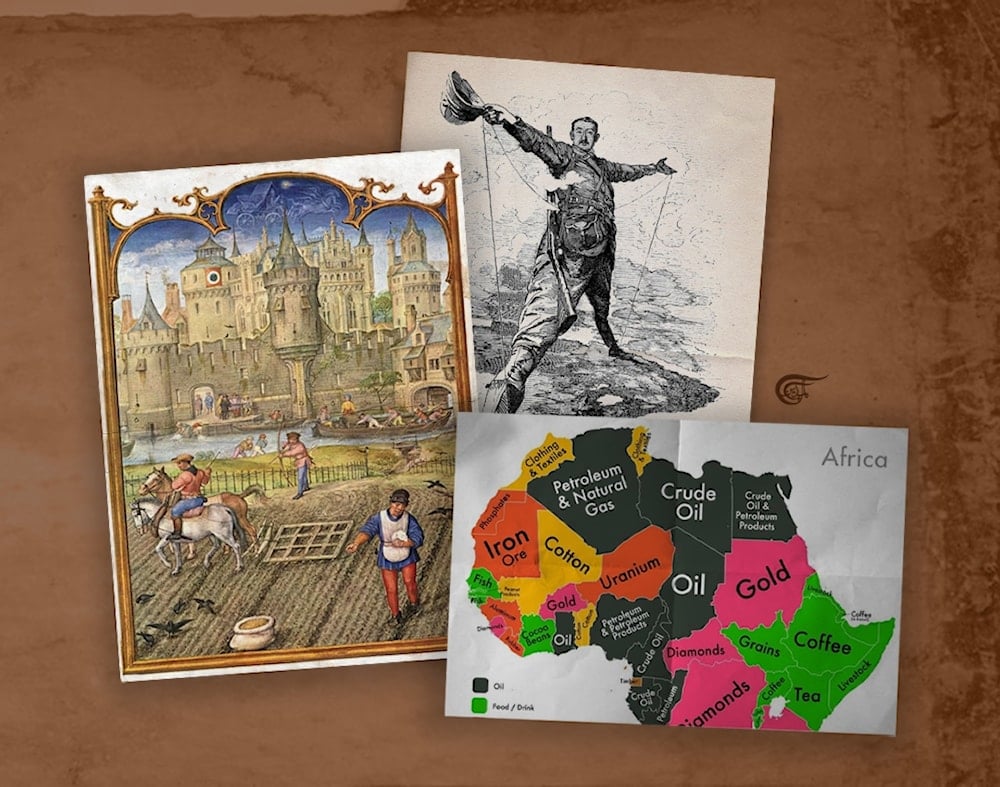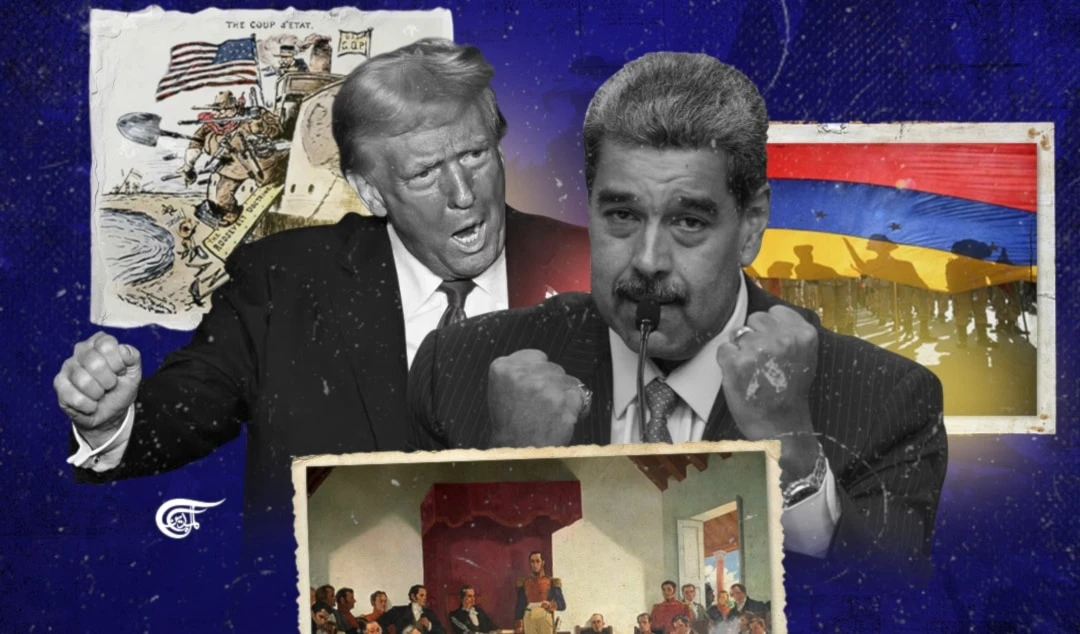Rebellion against hegemony and neocolonialism: thoughts on the struggle
Alexander Tuboltsev likens Western neocolonialism to a parasitic plant feeding off others, tracing its origins from medieval feudalism to today’s global capitalist hegemony, and calling for global resistance.
-

A complete victory over unipolar hegemony and neocolonialism must be not only economic and political, but also cultural and social. (Al Mayadeen English; Illustrated by Zeinab El-Hajj)
Sometimes nature allows us to draw striking analogies with social life.
The Cuscuta is a fairly common plant. This is a harmful weed that wraps itself around other plants and uses threads (they are called haustoria) to dig into their stems, taking away useful, nutritious juices. A plant that has been affected by Cuscuta is weakened and may even die. It seems that the malicious Cuscuta is very similar in its essence to the model of Western neocolonialism and hegemonism. In both cases, we are talking about resource theft: if Cuscuta steals the nutritious juices of plants, then neocolonial states and corporations steal the natural resources of the affected countries.
How did this vicious, exploitative system arise and develop? And how can we fight it?
As you know, in the Early Middle Ages in Europe, rural and urban communities were the main form of social organization. Collective land ownership prevailed in them, residents jointly defended their settlements from threats, and local self-government functioned. However, these communities were subject to seizures by feudal aristocrats, who used military force against them, seized land, and imposed huge taxes and duties on the inhabitants of the communities. The aristocratic landowners tried to destroy the system that prevented them from establishing their rigid hierarchical authority on the ground.
In my opinion, this can be called proto-colonialism. Feudal aristocrats turned former rural communities into their own personal colonies, introduced serfdom (essentially a form of slavery), and exploited local resources and populations. Large fiefdoms appeared in the territories taken from the communities, such as the latifundia on the Iberian Peninsula during the formation of the kingdoms of Aragon, Castile, and Navarre. Landless peasants were exploited, and landowners sought to enrich themselves.
Gradually, new feudal states sought to expand, seizing new territories. We can recall the campaign of the French kings Philip II and Louis VIII against the Albigenses in 1209-1229. There were political and religious reasons for this conflict, but let's not forget about the economic aspect. The goal of the campaign was the lands in the south of France, which were more urbanized and more economically developed than the territories in the north of the kingdom. Numerous feudal lords from the north of France (for example, from Picardy and Brittany) participated in a campaign to seize land in the southern regions. Such seizures were accompanied by heavy fighting and mass deaths of civilians, as well as the destruction of the economy of cities and rural communities.
As we can see, this system was initially based on robbery and exploitation. The peasants in the communities were engaged in agriculture, the artisans in the cities were engaged in handicrafts, and the feudal lords did not produce anything themselves, but appropriated for themselves what the estates subordinate to them produced. Individual feudal clans rose and became royal and imperial dynasties. The first trade monopolies arose, and capital accumulation began. The domination of the feudal aristocrats was gradually replaced by the domination of capital. From proto-colonial invasions targeting rural and urban communities in Europe, new dynasties moved on to conquests of remote foreign territories. The predatory exploitation system required new resources to extract profits from trade monopolies and saturate the aristocratic elite with luxury goods.
This is how colonial empires were born, which brought to mankind a huge number of terrible crimes: slavery, genocide of indigenous peoples, privateering (legalized piracy and naval robbery), economic exploitation of the captured peoples. The colonialists destroyed traditional forms of social organization by invading Africa, Latin America, and Oceania. The colonial administrations took away land and freedom from the indigenous peoples and subjected them to merciless persecution.
Colonialism gave rise to hegemony based on the violent control of the metropolis over the occupied territories and waters. However, this control was expressed not only in political power and economic exploitation, but also in ideological dictatorship. The colonialists actively used propaganda and manipulation to consolidate their power. The colonial hegemony was often modified, and its representatives at different times were the Portuguese, Spanish, and British Empires. However, after the First and Second World Wars, the old colonial system began to collapse. National liberation movements appeared in Africa and Asia, their early historical predecessors were the Haitian Revolution of 1791-1804 (against French colonialism) and the revolutions in Latin America against Spanish colonialism in the 19th century (which greatly contributed to the weakening and further disintegration of the Spanish colonial empire). Colonialism (direct military occupation, control over conquered territory) turned into neocolonialism (economic exploitation of countries by former colonial empires). Using corporations, political pressure, and propaganda, Western countries continued to plunder the resources and populations of the Global South.
New forms of exploitation have emerged. The famous Brazilian scientist Ruy Mauro Marini described in his works one of these forms, which he called dependent capitalist accumulation. Using the example of Latin America, Marini described a situation where overexploitation of labor occurred in export-oriented dependent economies. Workers faced lower wages, increased work intensity, and longer working hours. A huge social gap was forming between the working class and the elite stratum. Production in dependent economies was oriented to the foreign market, and their own population was deprived of the goods they produced and did not have the means to buy them. This situation was a direct consequence of the policy of neocolonialism, because it was often due to Western corporations that carried out their exploitative activities in the countries of the Global South.
After 1991, neocolonialism became one of the main elements of the hegemonic unipolar dictatorship led by the United States. Western corporations, like the tentacles of a giant octopus, have spread all over the world. Aggressive interventions (from Yugoslavia to Afghanistan and Libya) were carried out with the aim of attacking sovereign States and seizing resources and transport corridors. With the help of its propaganda and mass media, the United States actively imposed destructive neoliberal ideology on other countries, promoting the idea of globalization (which simplified the expansion of American capital into foreign markets). The vicious exploitative system based on plunder continued to exist.
However, rapid changes have occurred in the world. The outstanding economic development of China, the growth of the economies of the Asia-Pacific region, and the creation of BRICS have become the stages of the coming new times. Western neocolonial hegemony began to weaken.
The logic of history is that Western neocolonialism, which is in crisis, will again try to take on a new form (just as in the 20th century, direct colonialism turned into a neocolonial model of economic and political exploitation). In my opinion, neocolonial countries (primarily the United States) and corporations may attempt to monopolize technologies, the digital industry, and information systems that play an increasingly important role in our world. In order to preserve the vicious, predatory neocolonial system, the United States and its satellites will try to attack the idea of a multipolar, just world order in various aggressive ways.
A complete victory over unipolar hegemony and neocolonialism must be not only economic and political, but also cultural and social. This is a long historical process. But let's ask ourselves: what exactly can be done to accelerate this process of liberation from the vicious neocolonial system?
It seems to me that a lot can be done.
Firstly, it is necessary to support national liberation movements opposed to colonialism and imperialism. It is especially important to support the Palestinian Resistance, which is a great revolutionary and patriotic force. The Palestinian people are waging a heroic struggle against Zionism. And as we know, Zionism is a criminal colonial product, an aggressive and bloody ideology.
The example of the Palestinian Resistance is inspiring to a huge number of people around the globe, and I am sure that in the coming years, this example will motivate and become a model for new generations of anti-imperialist and anti-colonial movements in various parts of the world.
Secondly, the fight against the hegemonic dictatorship in terms of culture and information is extremely important. It is necessary to popularize the heritage of thought of political theorists, scientists, historians, and philosophers from the countries of the Global South, from Africa and Asia to Latin America and Oceania. It is important to promote the idea of intellectual multipolarity and reject the Western-centric paradigm that still exists in scientific thought. Thanks to the Internet and modern communication systems, the opportunities for cultural and educational work are very wide.
We can live in different time zones and speak different languages. However, we have a unifying feature: It is a rebellion against hegemony and Western neocolonialism. A real ideological and geopolitical revolution that will change eras and history. This is something in which we are united and in solidarity.
Western hegemonism is based on exploitation, plundering of resources, and unipolar dictatorship. We contrast this with the values of justice, equality, and fraternity.
Western hegemonism is based on neoliberal ideology, the cult of consumption, and egocentric individualism. We contrast this with the values of collectivism and mutual assistance.
Western hegemonism uses globalization to undermine the well-being of entire countries and peoples. We contrast this with the idea of multipolarity, sovereignty, and mutually beneficial cooperation between states.
I am sure that this position is shared by many people on all continents. And this is great. When an idea crosses borders and unites people's minds and hearts, then such an idea becomes a real force that gives people hope.

 Alexander Tuboltsev
Alexander Tuboltsev
 9 Min Read
9 Min Read











